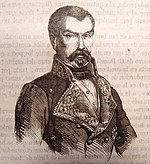Domingo Dulce, 1st Marquis of Castell-Florite, Date of Birth, Place of Birth, Date of Death
TweetDomingo Dulce, 1st Marquis of Castell-Florite
general
 Date of Birth: 07-May-1808
Date of Birth: 07-May-1808
 Place of Birth: Sotés, La Rioja, Spain
Place of Birth: Sotés, La Rioja, Spain
Date of Death: 23-Nov-1869
Profession: military personnel, politician
Nationality: Spain, Cuba
Zodiac Sign: Taurus 
About Domingo Dulce, 1st Marquis of Castell-Florite
- Domingo Dulce y Garay, 1st Marquis of Castell-Florite (Sotés (La Rioja), Spain, 7 May 1808 - Amélie-les-Bains-Palalda, France, 23 November 1869), was a Spanish noble and general, who fought in the First Carlist War and who served two times as Captain General of Cuba. He joined the Spanish army in 1823 at the end of the Trienio Liberal and participated in the First Carlist War under the command of the Christino Baldomero Espartero, a close friend.
- During the campaign he won four Lauriate crosses.
- His friendship with Espartero let to his collaboration during the Espartero or second regency while Isabel was a minor, during which period he was prominent in quelling the moderate liberal revolt of 1841 when Diego de León and Manuel de la Concha tried to enter the Royal Palace of Madrid and kidnap the young queen In the rank of general he participated in the Second Carlist War and beat the Carlist general Ramón Cabrera y Griñó.
- he supported General O'Donnell Bienio progresista and then faced a Carlist uprising at Sant Carles de la Ràpita which earned him he title of Marquis of Castell-Florite. During most the Liberal Union government period he was stationed in Cuba as Captain-General although his support of O'Donnell did not dispel their suspicion of him, even after he served as a senator from 1858 to 1860. During his stay in America he was noted for his clear commitment to abolish slavery, which earned him the enmity of the Spanish expatriates and open confrontation with Julian de Zulueta.
- On his return in 1866 he participated in the conspiracy that led to the revolution and the overthrow of Isabella in 1868.
- Although he was banished to the Canary Islands as a suspected progressive collaborator despite being one of the signatories of the manifesto that accompanied the revolution.He returned to Cuba, and is noted for having decreed for the first time on the island – 9 January 1869 – freedom of the press just a few months before his death on 23 November 1869.
Read more at Wikipedia
See Also
- Famous People's Birthdays on 07 May, Spain
- Famous People's Birthdays in May, Spain
- Famous People's Birthdays on 07 May, Cuba
- Famous People's Birthdays in May, Cuba
- Famous military personnel's Birthdays on 07 May, Spain
- Famous military personnel's Birthdays in May, Spain
- Famous politician's Birthdays on 07 May, Spain
- Famous politician's Birthdays in May, Spain
- Famous military personnel's Birthdays on 07 May, Cuba
- Famous military personnel's Birthdays in May, Cuba
- Famous politician's Birthdays on 07 May, Cuba
- Famous politician's Birthdays in May, Cuba

